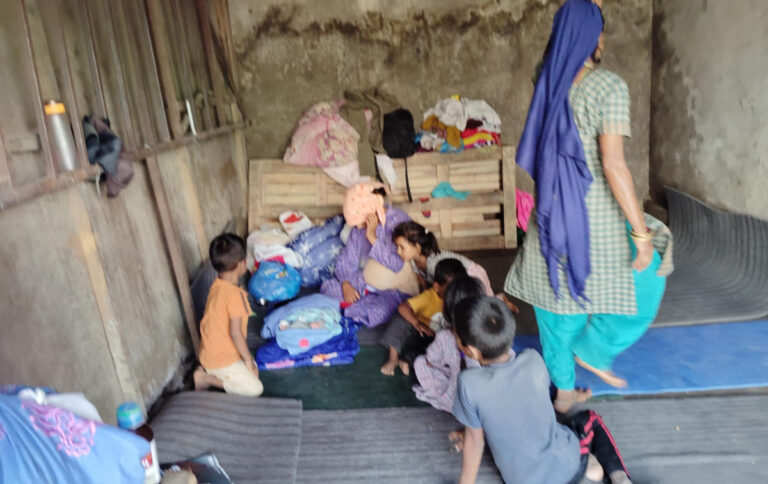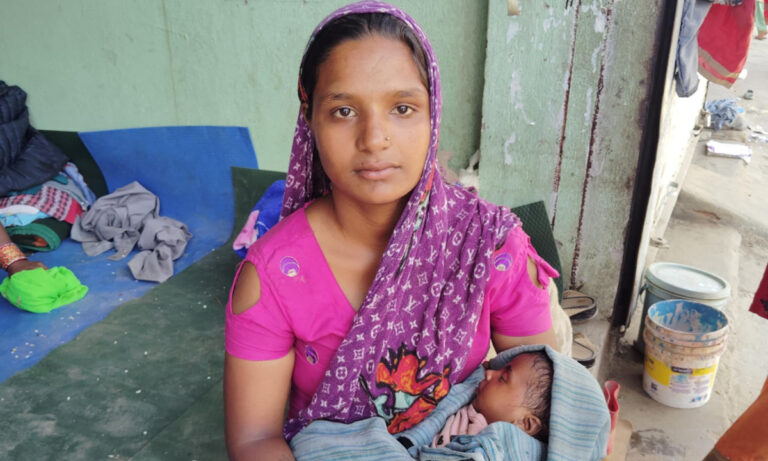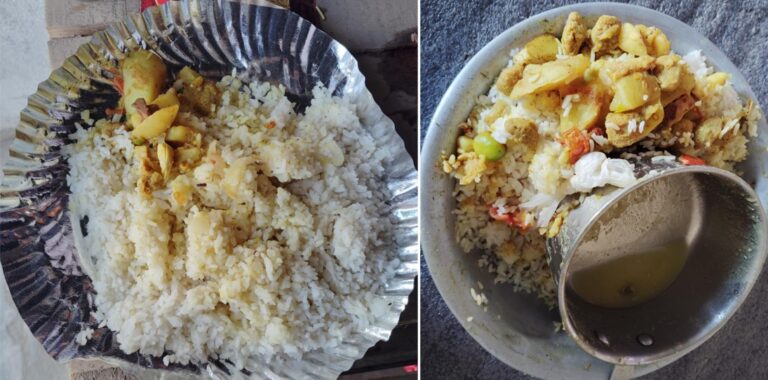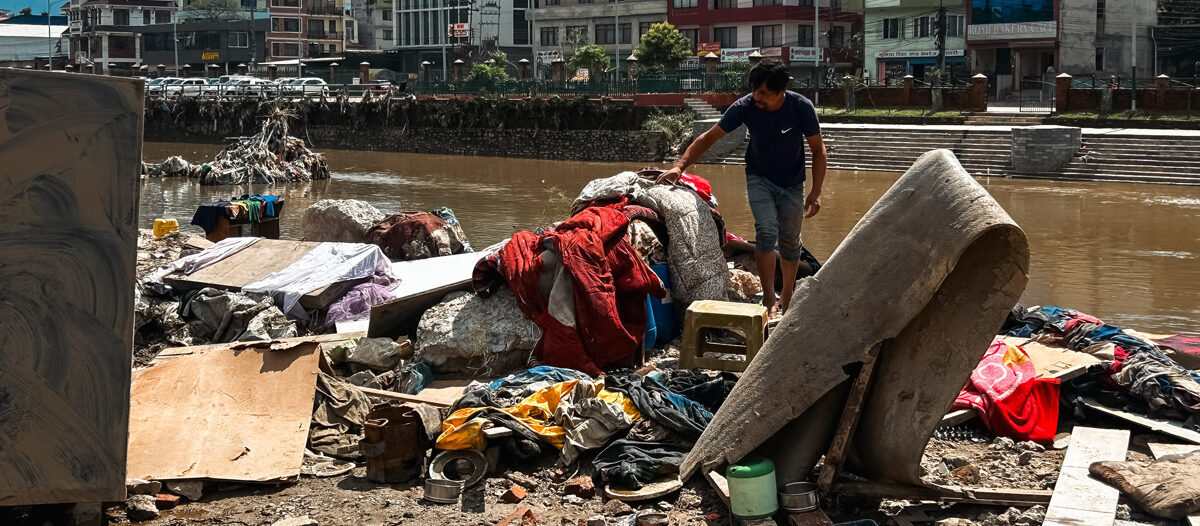KATHMANDU: Last Friday and Saturday, relentless rain wreaked havoc across the country.
According to the latest data from the Ministry of Home Affairs, more than 233 people have lost their lives, 23 are missing, and 158 have been injured.
Urban areas, including Kathmandu, Lalitpur, and Bhaktapur, were severely impacted by floods and landslides.
In light of this disaster, a team from Khabarhub visited the banks of the Bagmati River to report on the conditions faced by the residents of the squatter settlements.
Flood-affected individuals living along the Bagmati in Balkhu have been relocated to the Kumari Club in Kirtipur.
There, they were found sheltering in makeshift tin sheds, expressing their disillusionment with the government’s response.
Recent childbirth amidst crisis
Subina Mahat, 26, from Nepalgunj, had just given birth a day prior and was still recovering in the camp.
She lay her newborn on the cold ground, worried about having to rely on relief food during such a critical time.
“I’m not even happy about my child’s birth,” she lamented, recalling how she had to leave the hospital shortly after delivery. “My husband lost his passport, and with it, the money and documents we had.”

Citizenship lost in flood
Kiran Mahat, 25, moved to Kathmandu from Banke seven years ago and now has four children, with another on the way.
After four nights of sleeping on the cold ground, all her children developed fevers.
Kiran’s husband works, but the floods swept away their citizenship documents along with their belongings.
“Everything we had is gone. When will the government come to help us?” she questioned, looking down the road.

Feeling dehumanized
Ani Yonjan, 28, whose ancestral home is in Sindhupanchowk, expressed her despair at how squatters are perceived.
“To others, we are just squatters and no longer human beings,” she said, disheartened by comments from the mayor about sending squatters back to their villages.
“We didn’t come to Kathmandu to live in the villages; we came for a chance to survive.”
Living along the riverbanks, Ani’s family of six, including her 81-year-old grandfather, faced the floods head-on.
“When I returned home from work on Friday, the flood had already engulfed our house. We couldn’t escape. My grandfather insisted on rescuing our beloved dog, Jenny, even as the team urged us to leave it behind.”
Ani’s home is now uninhabitable. Despite working for an NGO, her meager salary of Rs 18,000 leaves her feeling powerless.
“I’ve studied much, yet I can’t do anything to help my family. What do we do now?” she said, her voice tinged with desperation.
Overcrowded and undernourished
Ani pointed to their current living conditions, saying, “25 to 30 people are crammed into a space meant for no more than five. Even drinking water is a challenge. It breaks my heart to see my grandfather, who has suffered for so many years, in this condition.”
Financial struggles
Samir Mahat from Rautahat, a house builder, was found living in a shelter with his 72-year-old mother, three children, and his wife after the roof of their squatter settlement was washed away.
He shared that he had to buy beaten rice to stave off hunger after the relief food was insufficient.
He lamented the lack of proper facilities for changing clothes, toilets, and water in the shelter.
Samir reported that all three of his children have started showing signs of fever and vomiting, and his mother is also ill.
He pleaded with the government for warm clothes and essentials, stating, “I lost ten thousand rupees in the flood and couldn’t do anything for my children.”
Unmet needs
Ramkumar Tamang, 38, from Gorkha Barpak, was also found in the shelter.
He expressed frustration over his inability to study due to poverty.
“Now we urgently need clothing, shelter, and water,” he said, noting that while private organizations are helping, he has yet to see any government support.
Ramkumar lives with his wife and two children. When rescue workers arrived at midnight, their single-story house had already been submerged, forcing them to take refuge on the second floor.
“I had a two-story bamboo house in the squatter settlement; now, everything is gone,” he recalled.
Having been involved in the Maoist people’s war, Ramkumar criticized Pushpa Kamal Dahal Prachanda for failing to assist squatters despite being prime minister multiple times.
“They become leaders just for their own benefit. I don’t believe the government will provide relief now,” he said.
It should be noted that the government has announced free treatment for those injured in the floods and landslides, but Ramkumar’s wife has not received care for her injured knee due to lack of funds.
“I lost around rs 300,000 when my house was swept away. I had some money, but couldn’t save it,” he added. He feels that the government is merely observing the plight of the slum dwellers without taking action.
Complaints about relief food
Many victims in the camp voiced their dissatisfaction with the relief food, describing it as raw and unhealthy.
Netraram Maut, 27, from Saptari, claimed that they were given spoiled rice.
“There was a terrible smell; the food was inedible. We were forced to eat poorly cooked rice soaked in water,” he said.
He criticized the cleanliness of those serving food, stating, “The person handing out food didn’t have clean hands, and it was evident that hygiene wasn’t a priority.”

Ani echoed this sentiment, noting that only pickles and fried rice were provided.
She remarked, “They even asked us to pose for pictures while receiving the food. It’s disheartening to witness such insensitivity.”
While not everyone felt the food was completely inadequate, many agreed that it was lacking in quality.
“The government hasn’t provided much, but at least we’re not starving. However, the food we receive should be properly cooked and nutritious.”









Comment